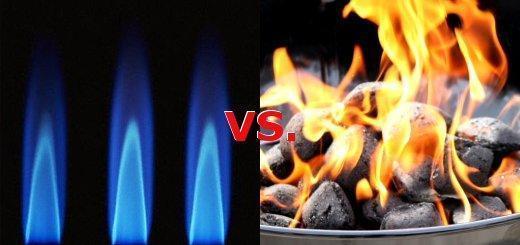It's the age old question: Gas or Charcoal? The flame debate between charcoal lovers and gas diehards has been going on now for years. Just read any of the top barbecue message boards, with both side making arguments for or against.
Basically Grills can be broken down to three types of cooking:
- High Heat - Food is placed directly above a heat source such as steaks. Usually there is no lid over the meat.
- Indirect heat convection roasting - Used for chickens and roasts when the heat source is off to the side and the food cooks by warm air circulating around it and with the lid down.
- Indirect Smoking - Lid closed when the warm convection airflow is heavy with flavorful hardwood smoke.
Searing or the process of browning the meats surface, is used mainly for steaks. When done right chemical reactions, the Maillard reaction and caramelization will a create rich, complex, sweet and savory compounds on the meats surface. Searing also dries the surface creating a crunchy crust. Despite what you might have been told, searing does not seal juices in. And when it comes to steak, you want an even sear from edge to edge, not just grill marks.
So to the grills: Charcoal grills will out sear a gas grill simply because they produce much more direct infrared heat. A few gas grills though, usually expensive ones, are equipped with special sear burners which also do a great job at searing meats. Gas on the other hand while used in 90% of steakhouse restaurants. because these commercial gas grills temperature between 800°F to 1,200°F. But for the backyard gas grill'er you are lucky enough to get temps in the 500°F range. Some gas grills as mentioned above come with a sear burner pushing temps up to 900°F or more on a small portion of the cooking surface, but they are expensive.
Another difference is smoke: A simple byproduct of combustion, and the smoke created from a gas and charcoal grill are very different. Charcoal will create much more smoke than gas, adding a much broader range of tasty flavors, this is because it is burning complex organic molecules, such as cellulose and lignin. Gas on the other hand is a simple molecule, and when fully combustive, adds no flavor at all, just water and carbon dioxide. You can however create smoke on by adding wood to either a gas or charcoal grills and don't forget that smoke happens as drippings from the food hit hot surfaces below.
So, why use a gas grill, simply they offer you convenience and control. Gas grills are easy to start compared to charcoal, they will heat up to temp usually between 10 to 15 minutes, they will also hold temperatures steadily or you can cool them down rapidly, they can be also be easy to configured for indirect and multi-zone cooking, and they are much easier to clean and maintain.
In the end I prefer having both grills around and it really depends on the meat, technique and time you have to prepare. I have also see some Grill-masters use both at the same time mostly to regulate heat and sear times.


